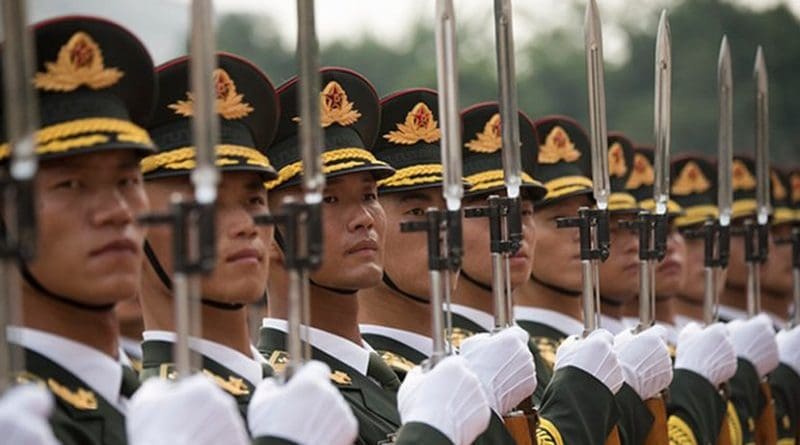China’s Defence White Paper
On 24 July, the Chinese government released its latest white paper on defence, updating the 2011 document, published before President Xi took office. The paper outlines China’s national defence strategy and explains the rationale for the recent significant reforms designed to help China best navigate the increasingly volatile global military environment.
In the press conference accompanying the launch of the white paper, State Council officials said that China had always been a peace-loving nation, as illustrated by the lack of offensive military action since 1949. The central concept at the basis of the nation’s military strategy had always been ‘self-defence.’
But the paper also indicates that China will not shy away from employing its military to defend its national interests. Compared to the previous strategy, this year’s white paper not only strikes an increasingly assertive tone towards Taiwan, but also identifies the United States as the single most precarious threat to China’s national security.
Using remarkably similar wording to the US National Defence Strategy, the Chinese government urges its military to become a ‘world-class defensive force’ and to prepare for an era of ‘strategic competition’. A commitment to building a world-class military had always been a pillar of ‘Xi Jinping thought’, which was formally codified in the nation’s constitution in 2017. The report alludes extensively to the additional financing and human resources that will be invested in cybersecurity and state-of-the-art technologies, such as the use of artificial intelligence and big data in military operations and defence (referred to as “intelligent warfare”).
Beyond going into the structures, proposed reforms and current state of the Chinese military forces, the report also makes specific mention of a number of concrete defence ‘questions’, such as the ‘Taiwan question’ and the US striving for “absolute military superiority”. Anti-American sentiments have been swelling throughout the Chinese government – stoked not only by what is regarded as aggressive and illegitimate military behaviour in e.g. the South China Sea and the adoption of ‘unilateral military policies’ aimed against China (raising defence expenditure, concluding military deals with Taiwan, undermining strategic global stability), but also by the on-going trade conflict.
The white paper explicitly calls on all members of the national defence forces to support the ‘modernization’ and ‘reforms’ of China’s military capabilities, in the face of increased aggression in Washington. The paper also paves the way for increased military drills and combat patrols in the Western Pacific and the South China Sea, and specifically notes the successful entering into operation in August 2017 of China’s first overseas military base, in Djibouti.
On Taiwan, the paper doubled down on President Xi’s line taken in his 2019 new year’s address, stating that if ‘separatist forces’ were to consolidate their position, the mainland would not hesitate to invoke the military to restore order. The report specifically denotes that the deployment of military ships and aircraft around and over Taiwan represents a legitimate measure to quail separatist forces – paving the way for progressive military engagement around Taiwan.
Overall, China’s latest military game plan reflects growing tensions in the western Pacific and although the paper clearly states that China will not seek military hegemony, it equally indicates that China is more willing and ready than ever to stand up to any acts of foreign aggression.
Analysts have pointed to the high likelihood of statistics in the report being skewed to deliberately hide a part of the nation’s actual military expenditure. Such an underrepresentation of expenses would allow the Chinese authorities to justify a future further rise in military spending. The Chinese also point to the fact that the US military spends more than six times the Chinese defence budget.
The EU is not directly mentioned in the paper, although the paper does indirectly blame Washington’s military allies for contributing to the dwindling of global stability. Neither the EU nor the US has so far responded to the white paper. The Mainland Affairs Council of Taiwan described the white paper as an unnecessary provocation, and, in accordance with previous lines taken, described mainland aggression as the single largest threat to peace and stability in Taiwan and the Strait, calling on Beijing to give up its threat of military force.

